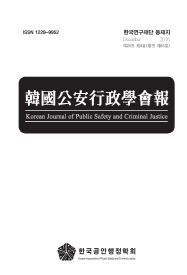최근 온라인 공간에서 사회적 공분을 일으키는 사건에 대한 집단 대응으로 사적제재가 나타나고 있다. 온라인 사적제재는 적극적인 온라인 플랫폼 활용, 익명의 다수에 의한 비난 등 오프라인 방식과는 구분되는 특징을 갖는다. 이 같은 특징에 주목하여, 이 연구는 온라인 공간의 주요 특성인 익명성과 온라인 집합효율성이 온라인 사적제재 참여 의향에 어떠한 영향을 미치는지 알아보고자 하였다. 구체적으로, 온라인 공간의 익명성이 온라인 집합효율성을 매개하여 온라인 사적제재 참여 의향에 이르는 간접 경로를 검증하였고, 집합효율성을 응집력과 비공식적 통제력이라는 하위요인으로 나누어 분석을 진행하였다. 연구를 위해 2024년 1월 전국 성인 남녀 1,000명을 대상으로 실시된 온라인 설문조사 데이터를 활용하였고, SPSS PROCESS Macro를 통해 매개효과 분석을 하였다. 분석 결과, 익명성과 온라인 사적제재 참여 의향의 관계에서 온라인 집합효율성의 두 하위요인은 모두 유의미한 정(+)적 매개효과를 가졌으며, 익명성의 직접효과는 유의미하지 않아 완전매개효과가 있는 것으로 확인되었다. 즉, 익명성에 대한 강한 인식은 온라인 집단의 응집력과 비공식적 통제 기능을 높여 온라인 사적제재에 대한 개인의 참여 의향을 높이는 것으로 나타났다. 이 연구는 집단적 규범 실현의 측면에서 익명성의 기능을 확인하고, 온라인 사적제재의 참여를 조율하는 매개 요인으로서 온라인 집합효율성의 역할을 규명하였다는 점에서 의의를 지니며, 연구 결과에 기반하여 건전한 정의 실현을 위한 정책적 방안을 제안하였다.
In recent years, instances of online vigilantism have become increasingly prevalent as collective responses to social incidents within digital spaces. Unlike traditional offline practices, online vigilantism is characterized by the active use of online platforms and mass criticism carried out anonymously. Focusing on these distinct features, this study investigates how these two major characteristics of online environments—anonymity and online collective efficacy—influence individuals’ willingness to participate in online vigilantism. Specifically, the study examines the indirect effect of perceived anonymity on willingness to engage in online vigilantism through the mediating role of online collective efficacy, which is further divided into two sub-factors: cohesion and informal social control. Data were drawn from a nationwide online survey of 1,000 Korean adults conducted in January 2024. Mediation analysis was performed using the SPSS PROCESS macro. The results reveal that both sub-factors of online collective efficacy significantly and positively mediated the relationship between anonymity and willingness to participate in online vigilantism. However, the direct effect of anonymity was not statistically significant, indicating a full mediation effect. In other words, a heightened perception of anonymity increases participation in online vigilantism by enhancing group cohesion and informal control within online communities. This study highlights the functional role of anonymity in fostering normative group behavior and identifies online collective efficacy as a critical mediating factor in the dynamics of online vigilantism. Based on these findings, policy recommendations are proposed to support the healthy realization of justice in online spaces.
Ⅰ. 서 론
Ⅱ. 이론적 배경
Ⅲ. 연구 방법
Ⅳ. 분석 결과 및 함의
Ⅴ. 결 론
참고문헌
(0)
(0)
